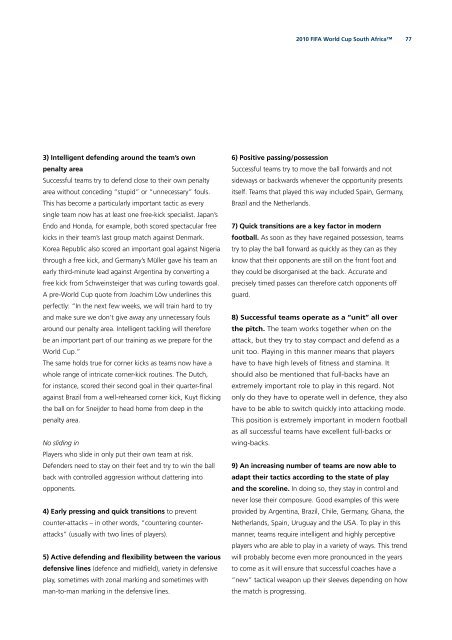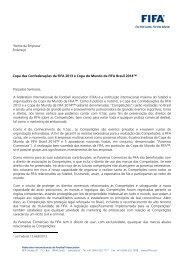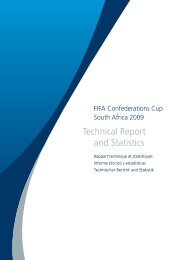You also want an ePaper? Increase the reach of your titles
YUMPU automatically turns print PDFs into web optimized ePapers that Google loves.
3) Intelligent defending around the team’s own<br />
penalty area<br />
Successful teams try to defend close to their own penalty<br />
area without conceding “stupid” or “unnecessary” fouls.<br />
This has be<strong>com</strong>e a particularly important tactic as every<br />
single team now has at least one free-kick specialist. Japan’s<br />
Endo and Honda, for example, both scored spectacular free<br />
kicks in their team’s last group match against Denmark.<br />
Korea Republic also scored an important goal against Nigeria<br />
through a free kick, and Germany’s Müller gave his team an<br />
early third-minute lead against Argentina by converting a<br />
free kick from Schweinsteiger that was curling towards goal.<br />
A pre-World Cup quote from Joachim Löw underlines this<br />
perfectly: “In the next few weeks, we will train hard to try<br />
and make sure we don’t give away any unnecessary fouls<br />
around our penalty area. Intelligent tackling will therefore<br />
be an important part of our training as we prepare for the<br />
World Cup.”<br />
The same holds true for corner kicks as teams now have a<br />
whole range of intricate corner-kick routines. The Dutch,<br />
for instance, scored their second goal in their quarter-fi nal<br />
against Brazil from a well-rehearsed corner kick, Kuyt fl icking<br />
the ball on for Sneijder to head home from deep in the<br />
penalty area.<br />
No sliding in<br />
Players who slide in only put their own team at risk.<br />
Defenders need to stay on their feet and try to win the ball<br />
back with controlled aggression without clattering into<br />
opponents.<br />
4) Early pressing and quick transitions to prevent<br />
counter-attacks – in other words, “countering counterattacks”<br />
(usually with two lines of players).<br />
5) Active defending and fl exibility between the various<br />
defensive lines (defence and midfi eld), variety in defensive<br />
play, sometimes with zonal marking and sometimes with<br />
man-to-man marking in the defensive lines.<br />
<strong>2010</strong> <strong>FIFA</strong> World Cup South Africa<br />
6) Positive passing/possession<br />
Successful teams try to move the ball forwards and not<br />
sideways or backwards whenever the opportunity presents<br />
itself. Teams that played this way included Spain, Germany,<br />
Brazil and the Netherlands.<br />
7) Quick transitions are a key factor in modern<br />
football. As soon as they have regained possession, teams<br />
try to play the ball forward as quickly as they can as they<br />
know that their opponents are still on the front foot and<br />
they could be disorganised at the back. Accurate and<br />
precisely timed passes can therefore catch opponents off<br />
guard.<br />
8) Successful teams operate as a “unit” all over<br />
the pitch. The team works together when on the<br />
attack, but they try to stay <strong>com</strong>pact and defend as a<br />
unit too. Playing in this manner means that players<br />
have to have high levels of fi tness and stamina. It<br />
should also be mentioned that full-backs have an<br />
extremely important role to play in this regard. Not<br />
only do they have to operate well in defence, they also<br />
have to be able to switch quickly into attacking mode.<br />
This position is extremely important in modern football<br />
as all successful teams have excellent full-backs or<br />
wing-backs.<br />
9) An increasing number of teams are now able to<br />
adapt their tactics according to the state of play<br />
and the scoreline. In doing so, they stay in control and<br />
never lose their <strong>com</strong>posure. Good examples of this were<br />
provided by Argentina, Brazil, Chile, Germany, Ghana, the<br />
Netherlands, Spain, Uruguay and the USA. To play in this<br />
manner, teams require intelligent and highly perceptive<br />
players who are able to play in a variety of ways. This trend<br />
will probably be<strong>com</strong>e even more pronounced in the years<br />
to <strong>com</strong>e as it will ensure that successful coaches have a<br />
“new” tactical weapon up their sleeves depending on how<br />
the match is progressing.<br />
77







